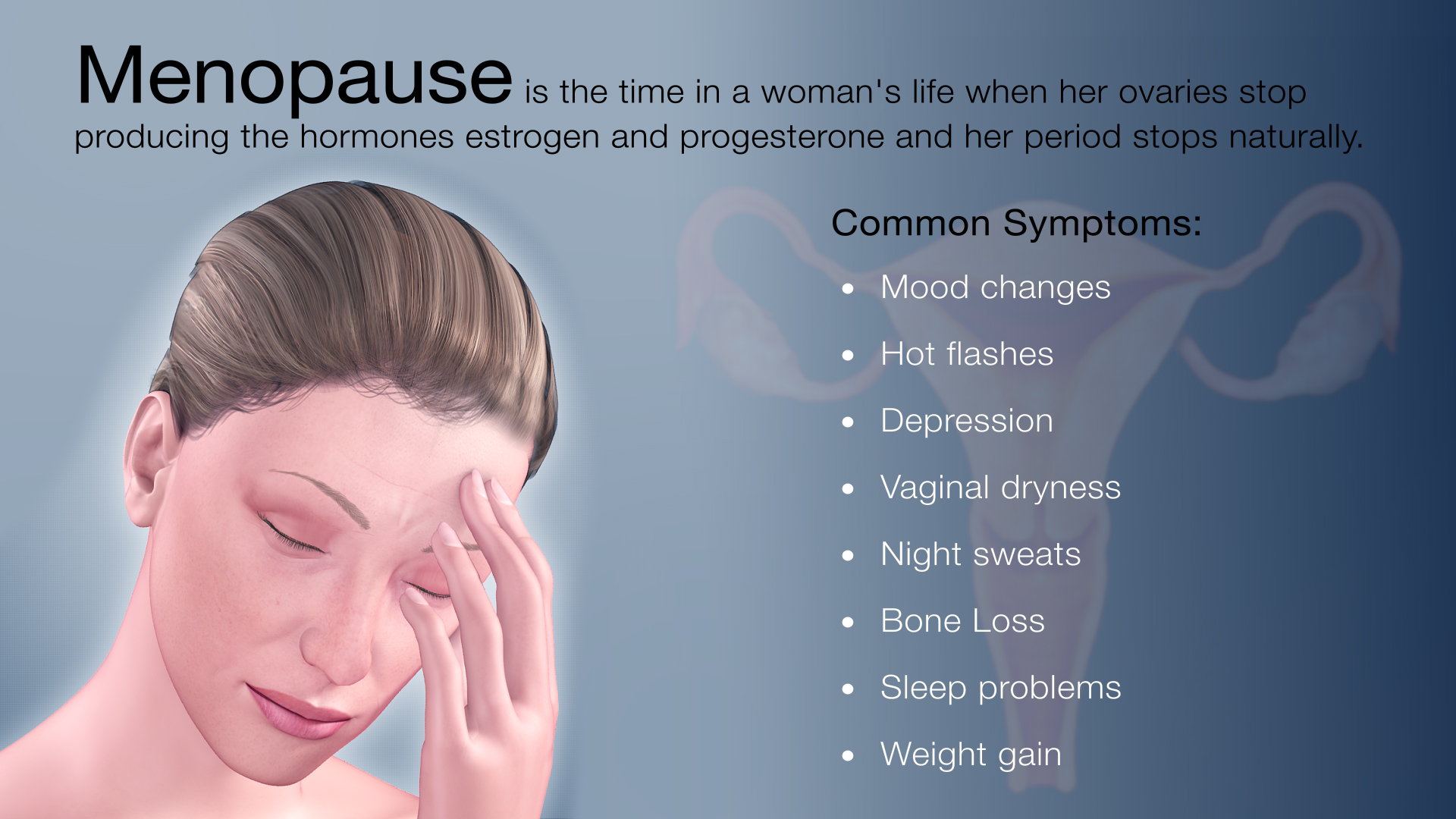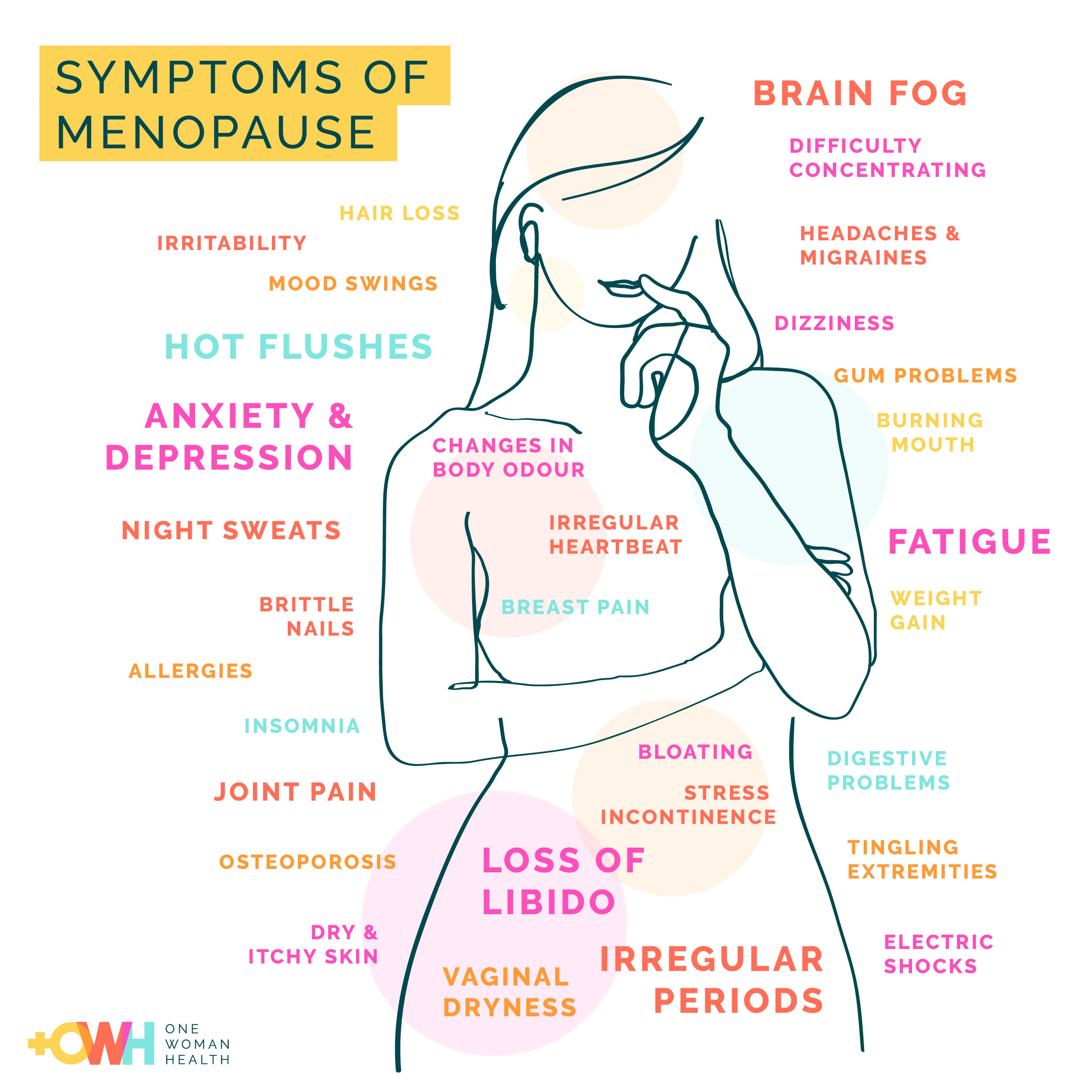Menopausal syndrome symptoms can significantly impact a woman’s physical and emotional well-being. Understanding these symptoms and developing coping mechanisms is crucial for maintaining quality of life during this transition.
Common symptoms include hot flashes, mood swings, sleep disturbances, physical discomfort, and vaginal changes. By recognizing these symptoms and implementing effective management strategies, women can navigate menopause with greater ease and confidence.
Hot Flashes and Night Sweats
Menopause is characterized by a decline in estrogen production, which can lead to a variety of symptoms, including hot flashes and night sweats. These symptoms are caused by changes in the body’s thermoregulation, which is the process of maintaining a constant body temperature.
During menopause, the ovaries stop producing estrogen, which causes the body to become more sensitive to changes in temperature. This can lead to hot flashes, which are sudden feelings of heat that can cause sweating, flushing, and a rapid heart rate.
Night sweats are similar to hot flashes, but they occur at night and can disrupt sleep.
Learn about more about the process of where is off the grid in the field.
Coping Mechanisms
There are a number of coping mechanisms that can help to manage hot flashes and night sweats. These include:
- Dressing in layers so that you can remove clothing if you start to feel hot.
- Taking a cool shower or bath.
- Using a fan or air conditioner to cool down.
- Drinking plenty of fluids to stay hydrated.
- Avoiding caffeine and alcohol, which can trigger hot flashes.
- Exercising regularly, which can help to reduce the severity of hot flashes.
- Talking to your doctor about hormone replacement therapy, which can help to relieve hot flashes and night sweats.
Mood Changes and Irritability
During menopause, hormonal fluctuations, particularly the decline in estrogen and progesterone levels, can significantly impact a woman’s emotional well-being. These hormonal changes can trigger mood swings, irritability, and emotional instability.
Estrogen and progesterone play crucial roles in regulating mood and emotional balance. Estrogen has a calming and mood-boosting effect, while progesterone helps stabilize mood and reduce anxiety. The decline in these hormones during menopause can disrupt these regulatory mechanisms, leading to emotional changes.
Notice nasal strips to stop snoring for recommendations and other broad suggestions.
Managing Mood Changes and Irritability
Managing mood changes and irritability during menopause requires a multifaceted approach. Here are some effective techniques:
- Exercise Regularly:Exercise releases endorphins, which have mood-boosting effects. Aim for at least 30 minutes of moderate-intensity exercise most days of the week.
- Get Enough Sleep:Sleep deprivation can worsen mood swings and irritability. Establish a regular sleep schedule and aim for 7-9 hours of quality sleep each night.
- Practice Relaxation Techniques:Stress can exacerbate mood changes. Incorporate relaxation techniques such as yoga, meditation, or deep breathing exercises into your routine.
- Seek Support:Talk to a trusted friend, family member, or therapist about your feelings. Sharing your experiences and seeking support can help you cope with emotional challenges.
- Consider Hormone Therapy:In some cases, hormone therapy may be an option to alleviate mood changes. Discuss the potential benefits and risks with your healthcare provider.
Sleep Disturbances
Menopause can significantly disrupt sleep patterns, leading to insomnia and fragmented sleep. Hormonal fluctuations, particularly the decline in estrogen levels, interfere with the body’s natural sleep-wake cycle.
Establishing Healthy Sleep Habits, Menopausal syndrome symptoms
To improve sleep quality during menopause, consider these tips:
- Establish a regular sleep schedule, even on weekends.
- Create a relaxing bedtime routine that includes calming activities like reading or taking a warm bath.
- Ensure your bedroom is dark, quiet, and cool.
- Avoid caffeine and alcohol before bed.
- Exercise regularly, but not too close to bedtime.
Physical Discomfort
Menopause is associated with various physical discomforts, including musculoskeletal and joint pain. These discomforts arise due to hormonal changes that affect the body’s connective tissues, leading to reduced flexibility and increased inflammation.
Musculoskeletal and Joint Pain
- Joint pain:Pain and stiffness in joints, particularly in the knees, hips, and fingers, are common during menopause. The reduced levels of estrogen affect the production of collagen, a protein that provides structural support to joints.
- Muscle pain:Muscles may become weaker and more prone to pain due to the decline in estrogen levels, which affects muscle mass and strength.
- Back pain:Hormonal changes can weaken the ligaments and muscles supporting the spine, leading to increased back pain.
Lifestyle Modifications and Therapies
To alleviate physical discomfort during menopause, several lifestyle modifications and therapies can be beneficial:
- Regular exercise:Engaging in low-impact exercises like walking, swimming, or cycling helps maintain joint mobility, strengthens muscles, and reduces pain.
- Weight management:Maintaining a healthy weight reduces stress on joints and muscles, alleviating pain.
- Heat and cold therapy:Applying heat or cold packs to sore muscles and joints can provide temporary relief.
- Massage therapy:Massages can help relax muscles, reduce tension, and improve circulation.
- Physical therapy:A physical therapist can provide personalized exercises and techniques to improve range of motion, reduce pain, and strengthen muscles.
Vaginal Changes and Urinary Issues: Menopausal Syndrome Symptoms
Menopause can bring about changes in the vagina and urinary system due to declining estrogen levels.
Obtain direct knowledge about the efficiency of what is off grid solar power system through case studies.
Vaginal Dryness
Vaginal dryness is a common symptom during menopause. Reduced estrogen levels cause thinning and drying of the vaginal walls, leading to discomfort during intercourse and increased risk of vaginal infections.
Obtain access to solar panels off grid power systems to private resources that are additional.
Treatments and Lifestyle Adjustments:
- Vaginal moisturizers: Over-the-counter or prescription vaginal moisturizers can help lubricate the vagina and relieve dryness.
- Vaginal estrogen therapy: This can be in the form of creams, tablets, or rings that release estrogen directly into the vagina, helping to restore moisture and elasticity.
- Lifestyle changes: Avoiding harsh soaps, wearing cotton underwear, and using a humidifier can help reduce vaginal dryness.
Urinary Incontinence
Urinary incontinence, or the involuntary loss of urine, can also occur during menopause. Weakened pelvic floor muscles and changes in the urethra can contribute to this symptom.
Treatments and Lifestyle Adjustments:
- Pelvic floor exercises (Kegels): Regularly performing Kegels can strengthen the pelvic floor muscles and improve urinary control.
- Bladder training: This involves gradually increasing the time between bathroom visits to retrain the bladder to hold more urine.
- Medication: Prescription medications can help reduce bladder spasms and improve urinary incontinence.
- Surgery: In severe cases, surgery may be an option to correct underlying structural issues.
Ultimate Conclusion
Managing menopausal syndrome symptoms requires a holistic approach that addresses both physical and emotional aspects. Lifestyle modifications, therapies, and support systems can empower women to alleviate discomfort, improve well-being, and embrace this new chapter of their lives.
Key Questions Answered
What causes hot flashes during menopause?
Hot flashes are triggered by hormonal fluctuations, particularly a decrease in estrogen levels, which affects the body’s temperature regulation.
How can I improve my sleep quality during menopause?
Establish a regular sleep schedule, create a relaxing bedtime routine, and avoid caffeine and alcohol before bed.
What lifestyle modifications can help alleviate physical discomfort during menopause?
Regular exercise, maintaining a healthy weight, and practicing relaxation techniques can reduce aches and pains.


